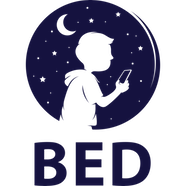Brad Brosnan is a registered dietitian and has first-hand experience in working with the effects of obesity in the community, especially in the area of mental health. He has been inspired to extend his research expertise and to gain more knowledge on practical ways to assist others in achieving a healthy lifestyle.
The BED Study
As part of his PhD studies, Brad Brosnan is running the Bedtime Electronic Devices (BED) study. This study aims to understand how the use of electronic media (screens), both before and in-bed, affects sleep in children.
EDOR has discovered that not getting enough high-quality sleep is a crucial risk factor for obesity in children. With more than a third of New Zealand's children and adolescents being overweight or obese, it is important to investigate the role of screen use on sleep and subsequent dietary intake.
The BED study aims to accurately and objectively measure screen use throughout the night, including the times when parents may not be aware that children are using devices. The study will also explore how evening screen use might influence sleep during the night, and affect dietary intake and physical activity levels during the day.
A particular interest in lifestyle
Growing up in Arrowtown, Brad has always been interested in the outdoors and physical exercise. His University of Otago undergraduate degree in Physical Education and Nutrition led him to do a Masters in Dietetics.
Following his studies Brad was employed at Te Korowai Whariki, the regional forensic and rehabilitation inpatient mental health service. Here he worked to make exercise and dietary interventions fun for those facing serious and enduring mental health challenges. These experiences have led him to undertake research that aims to help prevent life-style-related health problems early in life.
Why do research on screen use?
Brad has always been interested in a practical approach to health and nutrition. He is keen to understand all of the behavioural factors, such as sleep, that might influence weight and obesity. While there are suggestions that pre-bed screen use affects sleep, there is a lack of good data to back this up. This is principally due to limitations in the current tools used to measure both sleep and screen use.
Developing and using novel approaches to this area of research is a key part of Brad's doctoral studies. He hopes that the resulting objective data gained in this longitudinal study will give insights into the complex behaviours that impact on the health and well-being of children and adolescents in Aotearoa.

